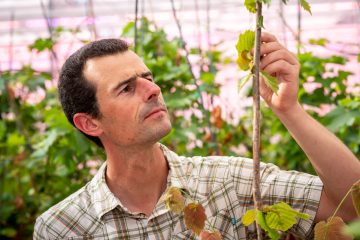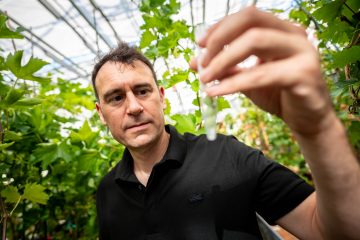Drought Resistance in Wine Grapes and Hazelnuts

This year, B.C. experienced an unusually warm and dry autumn. Vancouver recorded seven millimetres of rain this past September, a far cry from the city’s monthly average of nearly 60 millimetres. More than simply an extra long summer, this unseasonal weather has massive impacts on the agricultural sector.
LFS researchers Thorsten Knipfer and Simone Castellarin are working to understand the specifics of growing woody perennial crops during conditions of water stress by drought, and how we can sustainably manage one of the most important natural resources on our planet, water.
Knipfer’s research observes how plants react to varying levels of water availability in soil. His team studies hazelnut trees, an emerging woody perennial crop in the B.C. agricultural sphere. As with other woody and perennial plants, farmers have grown hazelnut trees for decades. Sustainable water management allows them to ensure their orchards maintain yield during dry summers without wasting water resources.
To gain a holistic understanding of the plant, Knipfer’s team observes how water interacts with the internals of the plant, using a pressure chamber to measure water tensions, a porometer to monitor water loss from leaves by transpiration, and x-ray computed microtomography to observe the fillings status of cells. In order, Knipfer describes these as the “heartbeat”, “breath”, and “hydration level” of the plant.
Irrigation management can be informed by water availability in the soil. Advanced strategies shift the focus to the plant itself, allowing growers to implement precision irrigation approaches that consider crop specific water requirements. Knipfer’s research attempts to identify thresholds of physiological performance to inform irrigation and create an optimum curve with drought stress conditions on one end and waterlogging conditions on the other.

Similar to Knipfer’s research on the conservation of irrigation water in times of drought, Castellarin’s research adds another element unique to wine grapes, taste.
Historically, grapes of all kinds are produced mostly in dry environments. Yet despite experiencing drought stress, the overall quality of wines made from these grapes could be excellent. Castellarin studies the impact of irrigation management in wine production, where moderate water deficits induced by drought periods can increase the quality of fruit as it decreases the quantity of yield.
Castellarin emphasizes the physiological responses of vines under regulated deficit irrigation, which forces the plant into a controlled state of moderate drought stress. His team monitors canopy growth, sugar production in fruits, and the compounds that create a wine grape’s distinct aroma.
These techniques are still new and developing, but are a promising step towards more sustainable irrigation that preserves water and maintains yield and quality of selected woody perennial crops. Together, their research will be applicable to other berry crops, such as blueberries and raspberries, in the coming years.
With more emphasis on the performance and physiological behavior of the plant, this research is applicable to natural systems. Heatwaves and drought conditions have caused tree mortality in forests, where the continuous water column between root and canopy ‘breaks’ and blocks transport of water and nutrients to leaves. Understanding plant physiological responses in natural and agricultural environments provides the foundation for making accurate predictions on how future climate conditions will impact our ecosystems.
Tagged with: 2022, Applied Biology, Faculty, Plant Science, Sustainable Agriculture and Environment, Wine Research Centre
